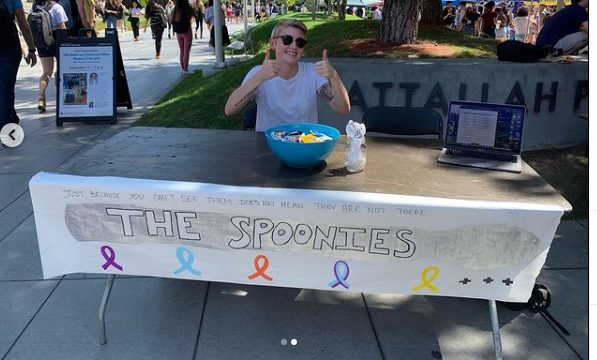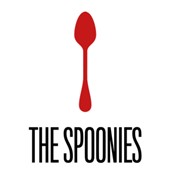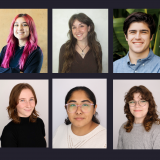
The Chapman Spoonies: Advocating for Access, Inclusion, and Awareness
May 14, 2021
 In 2018, senior Taylor Hein was diagnosed with systemic lupus erythematosus (SLE), an autoimmune disease that targets joints and internal organs. Later that year, she was also diagnosed with fibromyalgia, another autoimmune disease which causes muscular and nerve pain. “I felt alone on campus because none of my friends (who didn’t have a chronic illness) could understand this new aspect of my identity and life. Most people assumed that since I was young, I was healthy,” she notes.
In 2018, senior Taylor Hein was diagnosed with systemic lupus erythematosus (SLE), an autoimmune disease that targets joints and internal organs. Later that year, she was also diagnosed with fibromyalgia, another autoimmune disease which causes muscular and nerve pain. “I felt alone on campus because none of my friends (who didn’t have a chronic illness) could understand this new aspect of my identity and life. Most people assumed that since I was young, I was healthy,” she notes.
Hein, an English Literature, Rhetoric, and Cultural Studies major and Holocaust History and Disability Studies double minor in Wilkinson College, was convinced that there must be others like her on campus, and founded The Chapman Spoonies, a club named after the national organization of the same name that provides support for those with chronic illnesses at Chapman.
When chronic illness became an integral part of Hein’s life, she often found it difficult to cope with such a big change.
“Since I did not have any visible identifiers that I was disabled, such as a wheelchair or other assistive device, I wasn’t perceived as disabled. I struggled to navigate the healthcare system, as well as relationships with doctors, and I learned the hard way that I had to be an advocate for myself. My story, however, is not unique. So many other college students face the same issues and bear the weight of engaging in an ongoing battle with our bodies that no one can see,” she said.
What’s the scoop on the name “Spoonies?”
This metaphor was created by Christine Miserandino, a writer with lupus. Miserandino was with a friend who couldn’t understand why she had so much trouble accomplishing seemingly simple tasks. Miserandino used the closest objects at hand to illustrate her metaphor — spoons.
Spoon theory explains that someone who has a chronic health condition starts each day with a limited amount of energy. When you perform an action, you “spend” a spoon. When you have spent all your spoons, you are exhausted mentally or physically and can no longer perform even easy tasks.
Since November 2018, the Spoonies club has grown to dozens and consists of a diverse group of people with many different backgrounds and conditions, that according to Hein, “all bring a fresh perspective to Chapman community.”
“We have become activists and advocates for each other and our larger community,” she said.
The group meets weekly, focusing on issues such as finding the right doctors and using effective interpersonal communication with them to ensure the right care and workshops on how to obtain necessary housing accommodations at Chapman.
“These meetings reflect a larger goal we have for our club: that people learn to become strong, outspoken advocates for themselves and others.“
Despite recent developments in diversity and inclusion efforts, the disability community still feels unrepresented. Every semester, the Spoonies put on events including film screenings and open forum discussions, unfortunately, however, attendance has been low.
“At these events, we hope to educate both our members and those who are non-disabled about what the chronically ill community experiences on a daily basis. We are trying to bring awareness to these issues in hopes that more chronically ill students discover our club and more allies join our cause.”
Most recently, Lauren Lockwood, Program Coordinator for Office of Student Conduct, has met with the Chapman Spoonies regarding their concerns with Chapman’s reopening policies and procedures since the campus shut down in March 2020 due to the COVID-19 pandemic.
“I have really enjoyed working with the Chapman Spoonies so far, and I think their efforts are a great example for any students seeking to advocate for access, inclusion, and community change,” said Lockwood.
“There are many ways to advocate for issues that matter to you. I want to highlight the Chapman Spoonies efforts as extensive, thoughtful, and heartful. I met the Spoonies president, Taylor Hein, in the Advisory Group on the Status of Disability and Accessibility, and like all of the Advisory Groups under the Chapman Diversity Project, this forum has helped connect students, faculty, and staff who are passionate about an issue and to get us collaborating across our areas of influence to make concrete change,” Lockwood said.
You can follow @thechapmanspoonies on Instagram to learn more about their events and club.

